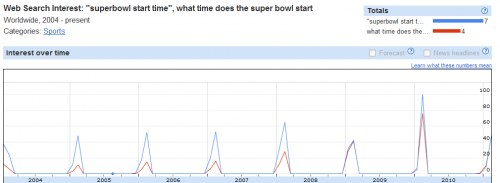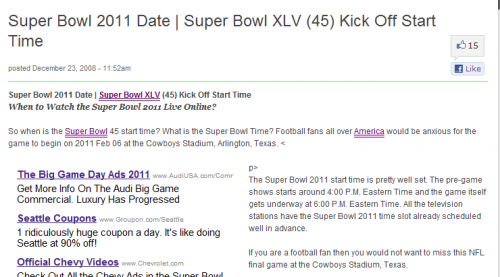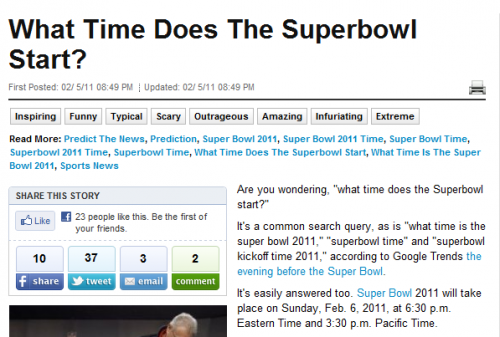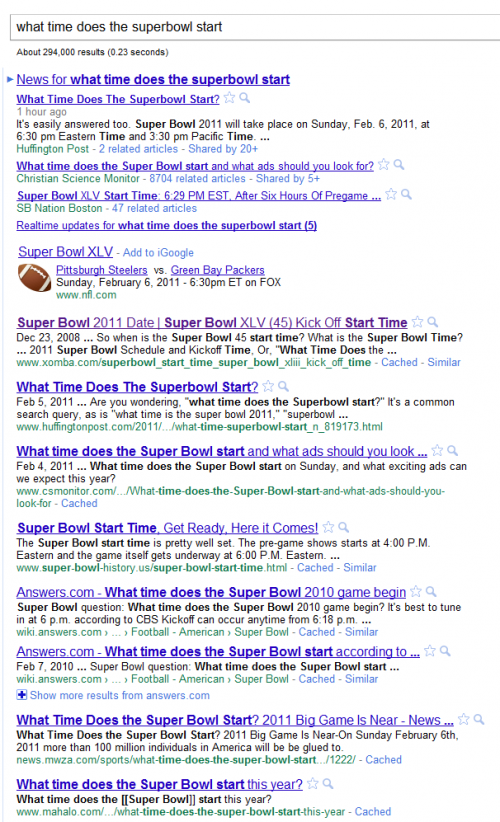What Time Does the 2011 Super Bowl Start? A (Continuing) Lesson in Search Visibility
(For those wondering what time the game really does start, the 2011 Super Bowl between the Green Bay Packers and the Pittsburgh Steelers kicks off on Fox at around 6:30pm ET.) Before the Super Bowl in both 2009 and 2010, I checked out the search engine results for the Super Bowl start time. In 2009, […]
(For those wondering what time the game really does start, the 2011 Super Bowl between the Green Bay Packers and the Pittsburgh Steelers kicks off on Fox at around 6:30pm ET.)
Before the Super Bowl in both 2009 and 2010, I checked out the search engine results for the Super Bowl start time. In 2009, the results were abysmal. No one was taking advantage of the clear searcher interest. One could argue that the search engines themselves did a poor job at surfacing relevant results but that argument assumes relevant results existed. The official sites were virtually uncrawlable. In 2010, the search engines took matters into their own hands, crafting “onebox” style results that appeared above the regular web search results. But the engines faltered a bit with search quality, as those web results were spammy and sad.
So how are things this year? Did the NFL and Fox take my free advice and turn it into an avalanche of web traffic? Did Google and Bing take my article as a spam report and clean things up? Let’s find out!
Seasonal Search Trends
Nearly every business can take advantage of seasonal interest. It’s not always as obvious as the Super Bowl start time, but Google Insights makes things practically that easy.
You can even see the related searches, so if you create content to help the searcher accomplish the task at hand, you incorporate all of the relevant searcher language.
“Hot” Trends
As with previous years, we see that lots of people want to know what time the Super Bowl starts:
Here’s the thing about search trends and seasonal searches. A lot of discussion lately has focused on “content farms” that write and publish content based on what people search for most. For the most part, these sites don’t provide a lot of value, as they’re not written by someone who’s an expert or passionate about a topic. They’re simply a bunch of words that match a popular topic. Google is working on algorithms to keep these types of pages from ranking well in search results. Danny Sullivan recently noted that if news publications such as the New York Times started running their businesses this way, they’d stop covering what’s happening and important in the world and instead just cater to the most popular topics.
To be clear, that’s not what I’m advocating. Instead, I’m saying that organizations such as the NFL and Fox could use search data to find out what their audiences need and make sure they are meeting those needs. In this case, the NFL audience is turning to the search box to find out what time the game starts. If the NFL would provide this information and make sure it’s visible in search, people would be happy and they’d tune into the game on time. Everyone wins.
Can Google Tell Us When the Game Starts?
I admit, I’m a little sad. Some of the same spammy sites from last year are still ranking. Xomba, which I called out in 2010 and which continues to rank well, is an infuriating collage of spamarrific delight, mixing every possible jarring combination of dates and numbers and words and broken HTML code into a spamtastic symphony that would make angels cry.
But do you know what else makes me sad? The Huffington Post. In my opinion, they lose all credibility as a serious news organization with articles like this one:
Seriously, Arianna? That’s just embarrassing.
Or maybe not. The page ranks highly on Google in both news and web results for this query.
And the NFL and Fox? Still nowhere to be found. (Note that the nfl.com result that you see is not a ranked result to their Super Bowl content; it’s a sports feed that Google has placed there manually in order to ensure searchers have a good experience and get the information that they need.)
I won’t rehash why that is. You can just read my article from last year and replace 2010 with 2011 and CBS with Fox. Well, except that Fox doesn’t even have the game listed on their home page (unless you watch the home page intently for more than 10 seconds and wait for the Flash images to rotate through). No, seriously. If not for web spam, I might not believe Fox was the right station.
As it was last year, both sites have all kinds of pre-game content that they likely would like to get in front of this very targeted and interested audience and lots of display ads they’d likely make lots of money with had they more page views.
Can Bing Tell Us When The Game Starts?
Those results were from Google. Does Bing do any better?
If it rains on game day, it’s because the angels have gone from delicate angel-like tears to full sobbing. Bing has nearly identical results to Google (same Xomba page; same super-bowl-history.us page that is a near duplicate of the Xomba page, the seriously-reporting-the-news-for-the-enrichment-of-all-of-our-lives Huffington Post), but also ranks a 2009 Associated Content page about the 2009 Super Bowl that is overflowing with knowledge:
“But a whole bunch of people don’t even know when the Super Bowl starts. As of noon EST today, here are some of the most frequent Google searches, based on the Google Trends site:
— Number One, “what time does the super bowl start 2009.”
— Number Five, “superbowl kick off time 2009”
— Number Six, “superbowl kickoff”
Well, at least these Google searchers know what year this is.
Believe it or not, there actually is one of those e-how web pages devoted to this dilemma. The title is, “How to find out the 2009 superbowl kickoff time.” In Step Two, this e-how web page tells you how to find out the 2009 Super Bowl kickoff time. It reveals that the Super Bowl kickoff in Tampa is scheduled to occur at precisely 6:18 p.m. EST.”
Pure, unfiltered wisdom.
Related Posts:
Contributing authors are invited to create content for Search Engine Land and are chosen for their expertise and contribution to the search community. Our contributors work under the oversight of the editorial staff and contributions are checked for quality and relevance to our readers. The opinions they express are their own.
Related stories
New on Search Engine Land





